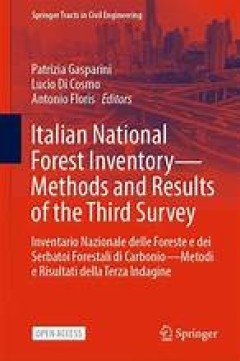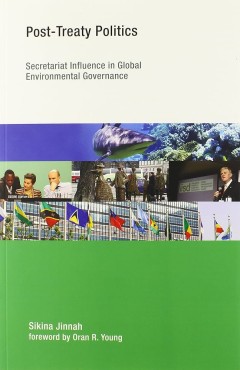Filter by

Human-Nature Interactions
This edited volume aims to widen the discussion about the diversity of human-nature relationships and valuation methods and to stimulate new perspective that are needed to build a more sustainable future, especially in face of ongoing socio-environmental changes. Conceptual and empirical approaches, including qualitative, quantitative, and mixed methodologies have been used to highlight the imp…
- Edition
- 1
- ISBN/ISSN
- 978-3-031-01980-7
- Collation
- -
- Series Title
- -
- Call Number
- XVIII, 438

Biodiversity-Health-Sustainability Nexus in Socio-Ecological Production Lands…
This is an open access book. It is a compilation of case studies that provide useful knowledge and lessons that derive from on-the-ground activities and contribute to policy recommendations, focusing on the interlinkages between biodiversity and multiple dimensions of health (e.g., physical, mental, and spiritual) in managing socio-ecological production landscapes and seascapes (SEPLS). This bo…
- Edition
- 1
- ISBN/ISSN
- 978-981-16-9893-4
- Collation
- -
- Series Title
- Satoyama Initiative Thematic Review
- Call Number
- XXIV, 286

Forest Radioecology in Fukushima
This is an open access book that provides holistic information on the radioactive contamination of forests. Topics are highly interdisciplinary, ranging from the dynamics of radioactive cesium in forest ecosystems to the radiation protection or the socio-economic aspects of radiation effects. It is designed to help people understand the radioactive contamination in forests and provide hints of …
- Edition
- 1
- ISBN/ISSN
- 978-981-16-9404-2
- Collation
- -
- Series Title
- -
- Call Number
- XXIV, 160

Oxygen Isotopes of Inorganic Phosphate in Environmental Samples
This open access book distinguished itself from other publications by offering step-by-step instructions on how to extract, purify, provide modifications, and major issues to be encountered during the process. For the δ18OP method to progress, further fundamental research as well as field and laboratory studies need to be conducted for a better understanding of P cycling in the environment. C…
- Edition
- 1
- ISBN/ISSN
- -
- Collation
- -
- Series Title
- -
- Call Number
- VII, 64

Italian National Forest Inventory—Methods and Results of the Third Survey
This open access book deals with the methods and the results of the third Italian national forest inventory (INFC2015). Arma dei Carabinieri is entrusted with the realisation of the National Forest Inventory and with the decisions about the aims of the survey and data treatment. National forest inventories produce statistically based information on forests over country areas. Such information i…
- Edition
- 1
- ISBN/ISSN
- 978-3-030-98678-0
- Collation
- -
- Series Title
- 1 b/w illustrations, 99 illustrations in colour
- Call Number
- XXXII, 576

Mobilities on the Margins
This open access book examines places on the margins and the dynamics through which a marginal position of a place is created. Specifically, it explores how places, mostly in sparsely populated areas, often perceived as immobile and frozen in time, come into being and develop through interference of everyday mobilities and creative practices that cut across the spheres of culture and nature as …
- Edition
- -
- ISBN/ISSN
- 978-3-031-41344-5
- Collation
- XVIII, 269
- Series Title
- -
- Call Number
- -

Artificiality and Sustainability in Entrepreneurship
This open access edited volume explores the past, present, and future of artificiality and sustainability in entrepreneurship – the unforeseen consequences and ways to advance to a sustainable future. In particular, it connects artificiality, sustainability and entrepreneurship, intertwining artificial with the specific phenomenon of those novel digital technologies that provoke continuous an…
- Edition
- 1
- ISBN/ISSN
- 978-3-031-11371-0
- Collation
- -
- Series Title
- FGF Studies in Small Business and Entrepreneurship
- Call Number
- VI, 264

Transformative Governance for the Future
This open access book helps actors who are committed to change unlock true innovative potential for the common good in their organizations. Innovation and change processes are not linear. Hence, this book presents a novel way to manage complexity. The author introduces readers to a comprehensive change management framework, the Eoh-for-Good blueprint methodology. It presents the method and disc…
- Edition
- -
- ISBN/ISSN
- 978-3-031-43131-9
- Collation
- -
- Series Title
- -
- Call Number
- -

Frontiers : histories of civil society and nature
In Frontiers, Michael Redclift examines the relationship between nature and society in frontier areas--contested zones in which rival versions of civil society vie with one another, often over the definition and management of nature itself. Drawing on his own fieldwork and extensive archival research, Redclift presents five cases in which civil societies emerged in frontier areas either to mana…
- Edition
- -
- ISBN/ISSN
- 9780262282185
- Collation
- 1 online resource (x, 237 pages) :illustrations, map
- Series Title
- -
- Call Number
- 333 RED f

Post-Treaty Politics: Secretariat Influence in Global Environmental Governance
"Foreword by Oran R. Young"--Cover.An argument that secretariats -- the administrative arms of international treaties -- are political actors in their own right.OCLC-licensed vendor bibliographic record.
- Edition
- -
- ISBN/ISSN
- 9780262325356
- Collation
- 1 online resource (xx, 245 pages) :illustrations.
- Series Title
- -
- Call Number
- -
 Computer Science, Information & General Works
Computer Science, Information & General Works  Philosophy & Psychology
Philosophy & Psychology  Religion
Religion  Social Sciences
Social Sciences  Language
Language  Pure Science
Pure Science  Applied Sciences
Applied Sciences  Art & Recreation
Art & Recreation  Literature
Literature  History & Geography
History & Geography